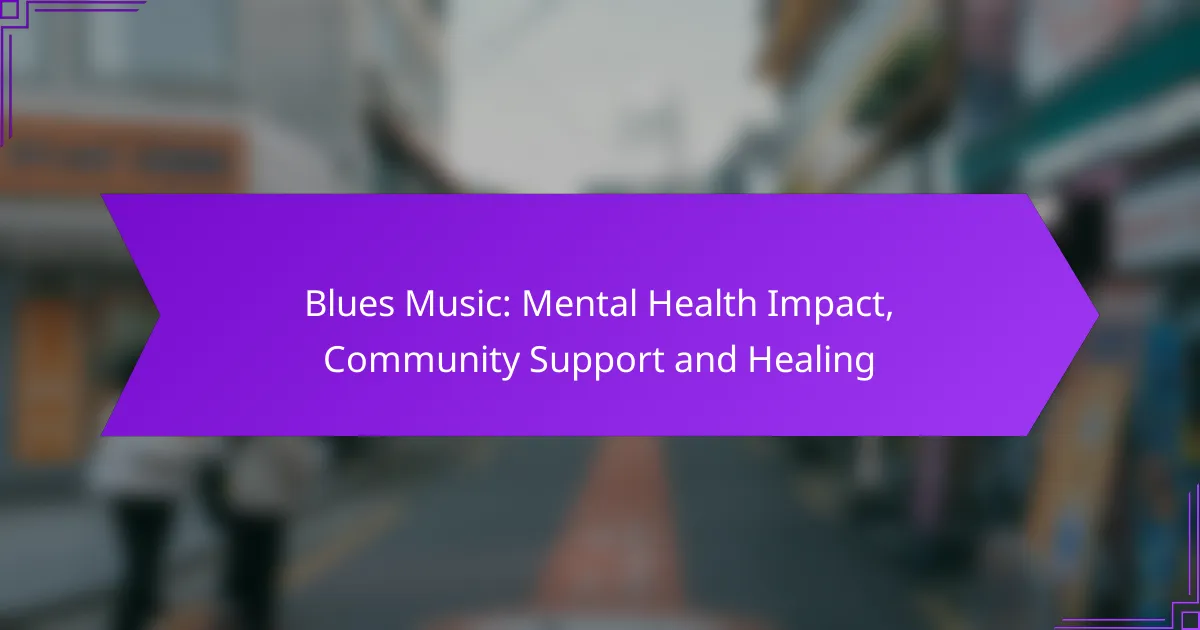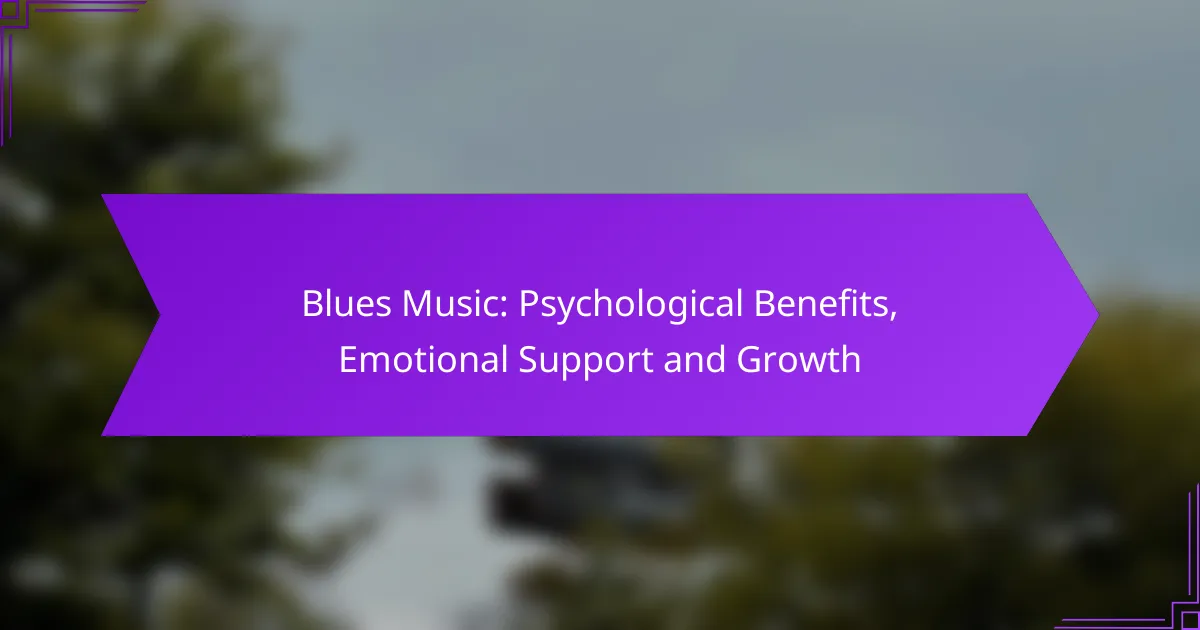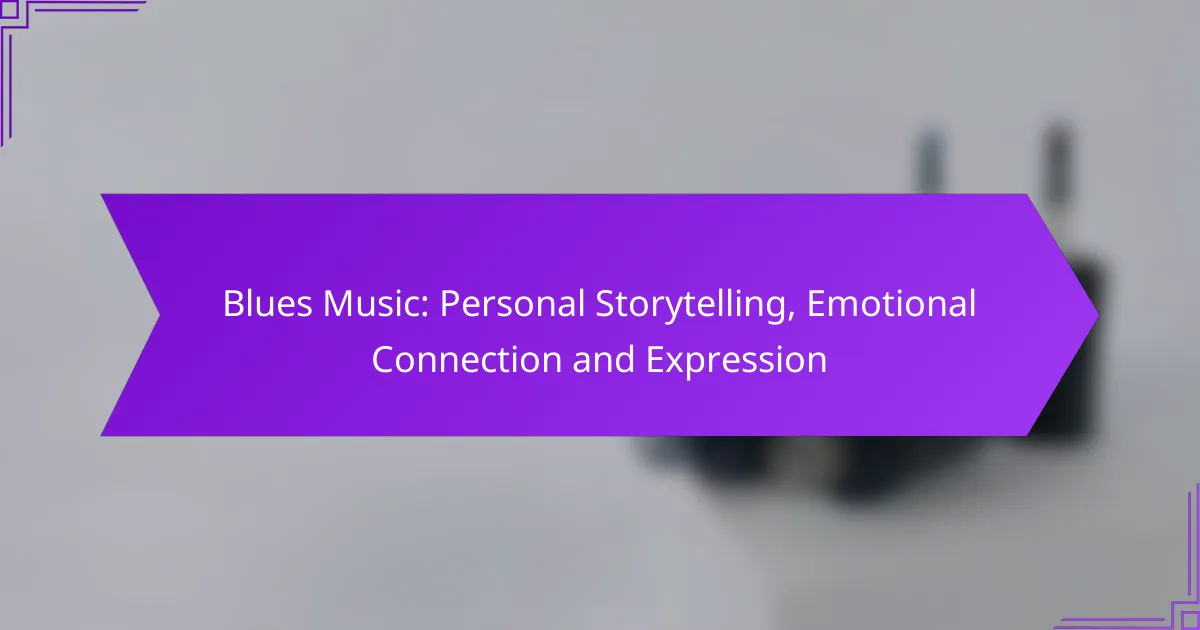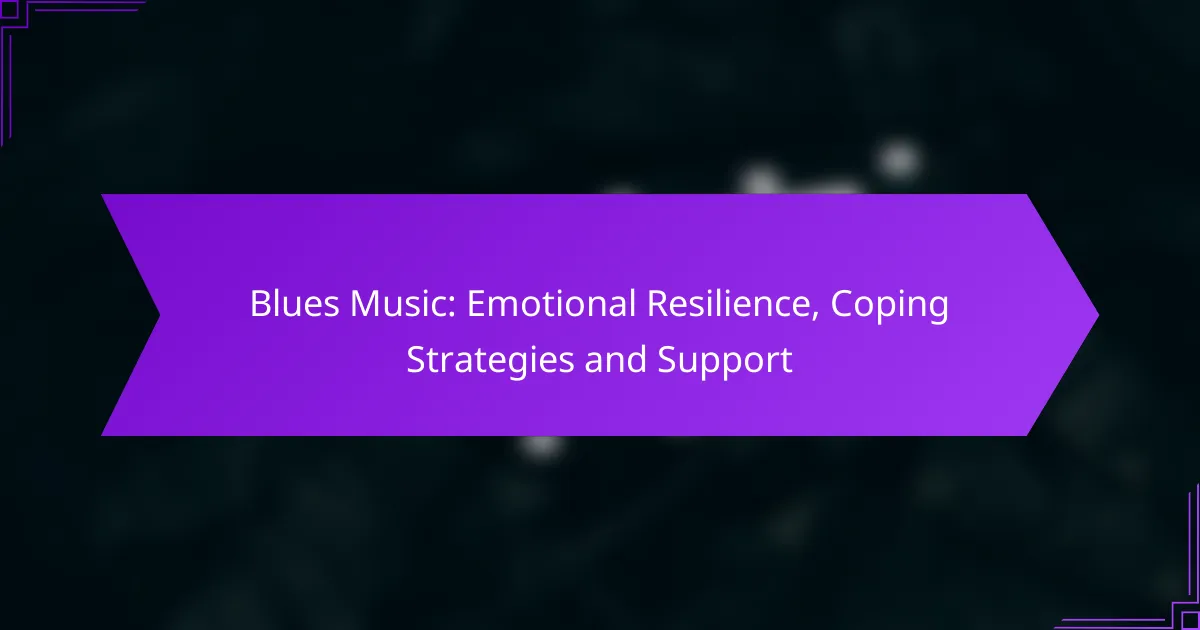Blues music serves as a powerful tool for mental health support, allowing individuals to express their emotions and connect with others who share similar experiences. Through its poignant lyrics and cultural significance, blues fosters a sense of community, helping people process their feelings and find solace in collective struggles and joys.
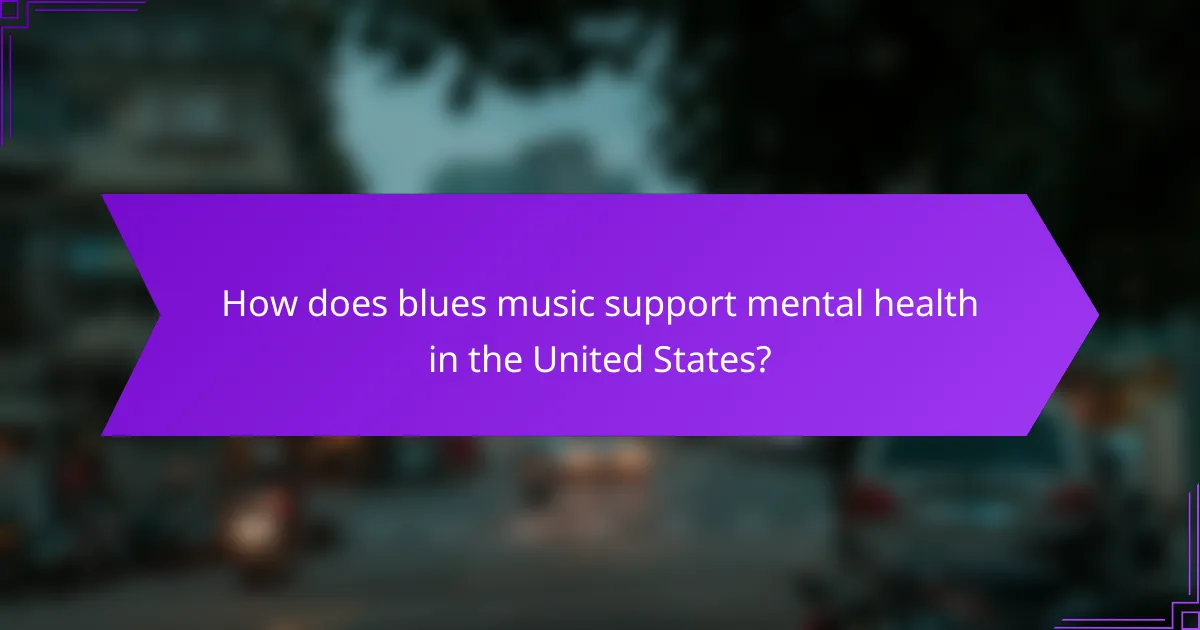
How does blues music support mental health in the United States?
Blues music plays a significant role in supporting mental health in the United States by providing a means for emotional expression and fostering community connections. Through its rich lyrical content and cultural significance, blues can help individuals process their feelings and find solace in shared experiences.
Emotional expression through lyrics
The lyrics of blues music often delve into themes of sorrow, love, and hardship, allowing listeners to connect with their own emotions. This form of expression can be therapeutic, as it validates personal struggles and encourages individuals to confront their feelings. For many, singing along or simply listening can serve as a release, helping to alleviate feelings of isolation.
Artists like B.B. King and Etta James have crafted songs that resonate deeply with listeners, providing a voice for those who may feel unheard. Engaging with these powerful narratives can lead to greater self-awareness and emotional healing.
Therapeutic benefits of blues music
Listening to blues music has been shown to have therapeutic benefits, including reducing anxiety and depression. The genre’s slow tempo and soulful melodies can create a calming atmosphere, promoting relaxation and emotional release. Many therapists incorporate music therapy into their practices, recognizing the impact that blues can have on mental well-being.
Participating in live blues performances can also enhance these benefits, as the communal experience fosters a sense of belonging and shared joy. Engaging with music in this way can be a valuable tool for those seeking to improve their mental health.
Community bonding in blues culture
The blues community offers a supportive environment where individuals can connect over shared experiences and struggles. Local blues clubs and festivals serve as gathering places, fostering relationships and encouraging dialogue about mental health. This sense of community can be crucial for those dealing with emotional challenges, as it provides a network of support.
Moreover, initiatives that promote blues music often include workshops and discussion groups focused on mental health, further strengthening community ties. By participating in these events, individuals can find camaraderie and understanding, which are essential for healing and personal growth.
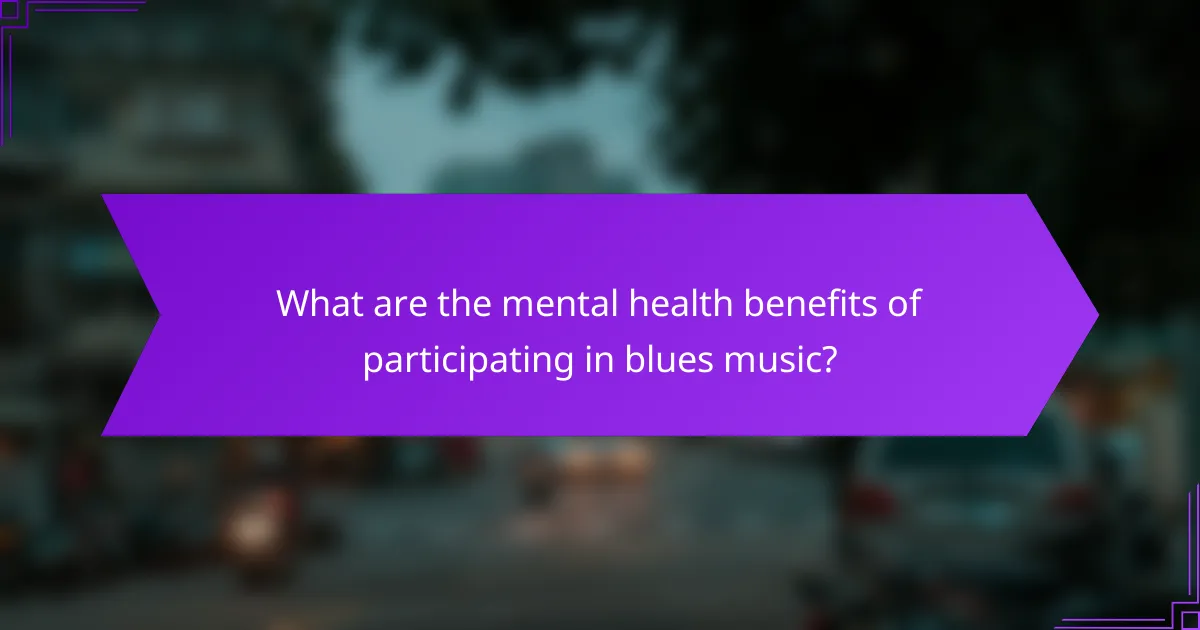
What are the mental health benefits of participating in blues music?
Participating in blues music offers significant mental health benefits, including emotional expression and community connection. Engaging with this genre can help individuals process their feelings and foster a sense of belonging.
Reduction of anxiety and depression
Blues music can serve as a therapeutic outlet for individuals experiencing anxiety and depression. The genre’s themes often resonate with personal struggles, allowing listeners and performers to confront their emotions in a supportive environment.
Playing or listening to blues can trigger the release of endorphins, which may alleviate feelings of sadness and anxiety. Regular participation in blues music activities, such as jam sessions or concerts, can create a routine that promotes emotional stability.
Improved emotional resilience
Engaging in blues music helps build emotional resilience by encouraging individuals to confront and express their feelings. This process can lead to a better understanding of personal challenges and an enhanced ability to cope with stress.
Through storytelling in lyrics and improvisation in performance, blues musicians often share their experiences, which can inspire others to navigate their own difficulties. Joining a blues community can provide additional support, fostering connections that reinforce resilience and encourage personal growth.
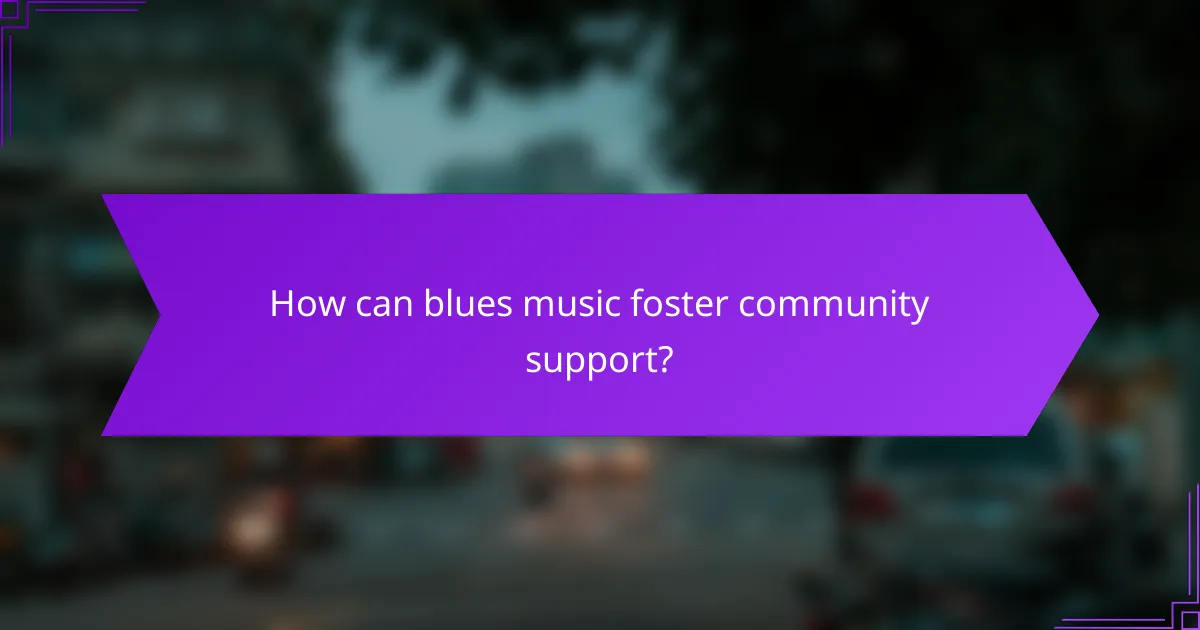
How can blues music foster community support?
Blues music fosters community support by bringing people together through shared experiences, emotional expression, and cultural connections. This genre creates a sense of belonging, allowing individuals to bond over common struggles and joys, ultimately strengthening community ties.
Local blues festivals and events
Local blues festivals and events serve as vibrant gatherings where musicians and fans unite to celebrate the genre. These events often feature live performances, workshops, and opportunities for networking, creating an inclusive atmosphere that encourages collaboration and support among attendees.
For example, festivals like the Chicago Blues Festival or the New Orleans Jazz & Heritage Festival not only showcase talent but also provide resources for mental health awareness and community engagement. Attending these events can enhance social connections and foster a sense of belonging.
Support groups within the blues community
Support groups within the blues community offer safe spaces for individuals to share their experiences and challenges related to mental health. These groups often meet regularly, providing a platform for discussion, encouragement, and healing through music and storytelling.
Many local blues clubs and organizations facilitate these support groups, creating an environment where members can connect over their love for blues music while addressing personal struggles. Engaging in these groups can help individuals feel less isolated and more empowered in their journeys.
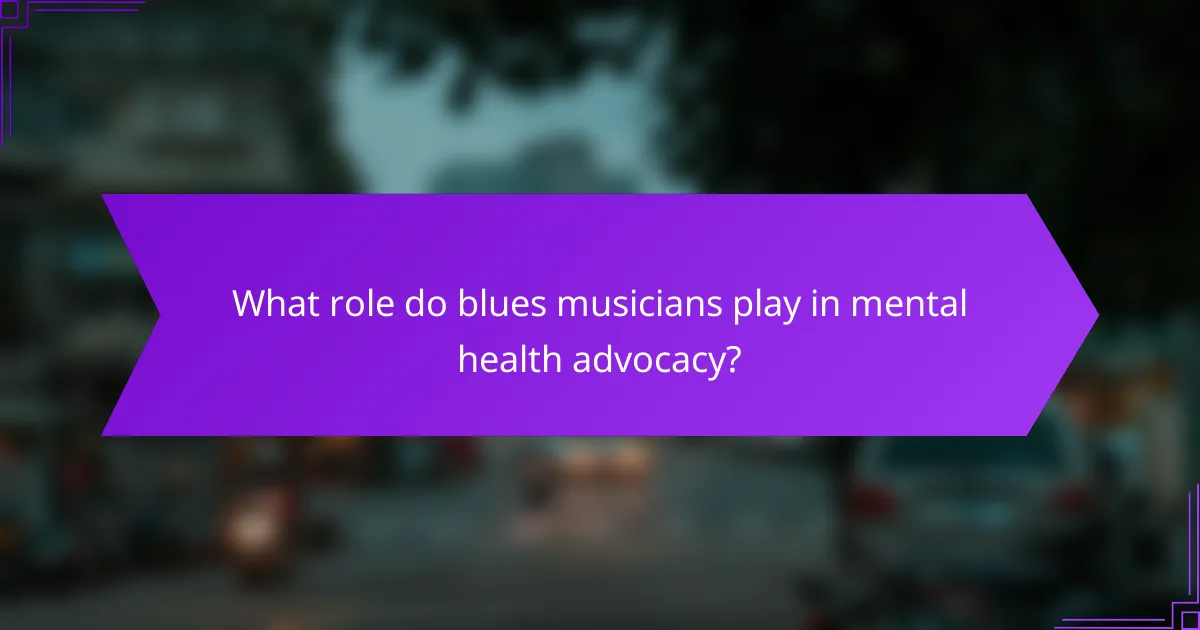
What role do blues musicians play in mental health advocacy?
Blues musicians play a significant role in mental health advocacy by using their music to address emotional struggles and raise awareness about mental health issues. Through their lyrics and performances, they create a platform for discussion and healing, often sharing personal experiences that resonate with audiences.
Raising awareness through performances
Blues performances often serve as a medium for raising awareness about mental health challenges. Musicians incorporate themes of struggle, resilience, and healing into their songs, which can help listeners feel understood and less isolated in their experiences. Concerts and festivals provide opportunities for artists to engage with audiences on these topics directly.
For example, many blues festivals include discussions or panels on mental health, allowing artists to share their stories and connect with fans on a deeper level. This not only entertains but also educates the audience about the importance of mental well-being.
Collaborations with mental health organizations
Many blues musicians collaborate with mental health organizations to promote awareness and support initiatives. These partnerships can involve fundraising concerts, workshops, or community outreach programs aimed at providing resources and support for those struggling with mental health issues. Such collaborations amplify the message that mental health is a vital aspect of overall well-being.
For instance, some artists donate a portion of their concert proceeds to mental health charities, helping to fund services and programs for individuals in need. These efforts not only raise funds but also encourage fans to seek help and support when necessary.
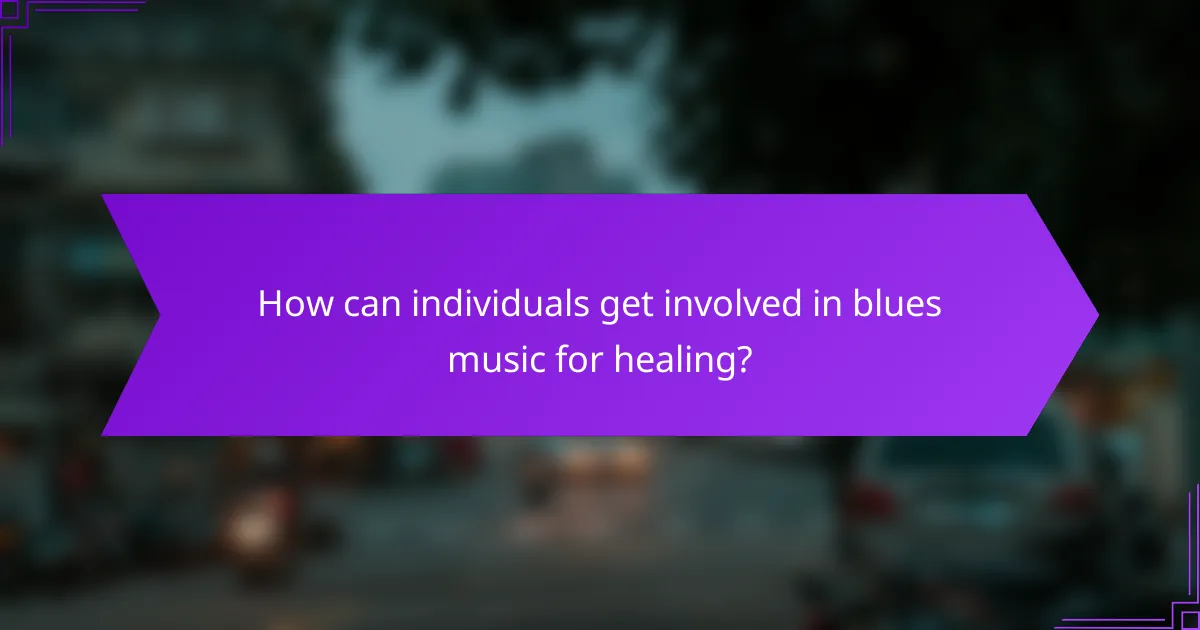
How can individuals get involved in blues music for healing?
Individuals can engage in blues music for healing by participating in local music scenes or therapeutic programs. These activities not only foster personal expression but also create supportive environments that promote mental well-being.
Joining local blues bands
Joining local blues bands offers a direct way to connect with others while expressing emotions through music. Look for community centers, music schools, or online platforms that list local bands seeking members. Participating in regular rehearsals and performances can enhance your musical skills and provide a sense of belonging.
Consider attending open mic nights or jam sessions to meet musicians and explore potential collaborations. These informal gatherings often welcome newcomers and can lead to lasting friendships and support networks.
Participating in music therapy sessions
Music therapy sessions focus on using music as a tool for emotional healing and personal growth. These sessions are typically led by certified music therapists who guide participants through various activities, such as songwriting, improvisation, and listening exercises. Engaging in these therapeutic practices can help individuals process feelings and improve mental health.
Check with local healthcare providers or community organizations for available music therapy programs. Many offer sliding scale fees or accept insurance, making them accessible to a wider audience. Participating in group sessions can also foster a sense of community and shared experience, enhancing the healing process.
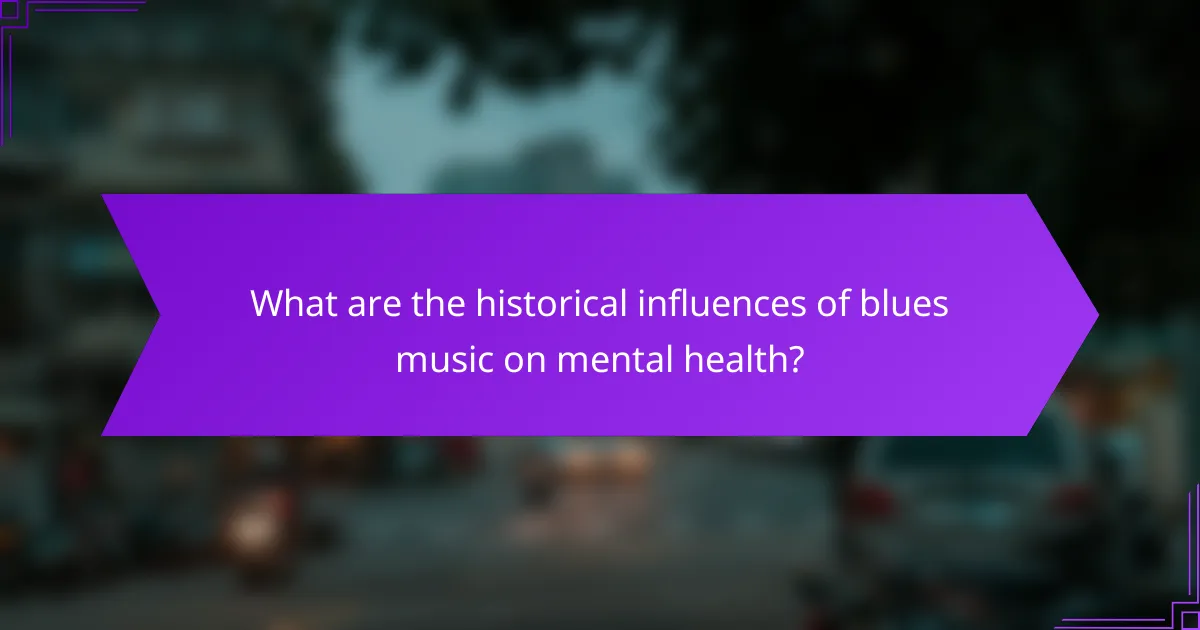
What are the historical influences of blues music on mental health?
Blues music has historically served as a powerful outlet for expressing emotional struggles, particularly those related to mental health. Its roots in African American history reflect themes of hardship and resilience, providing a means of coping and community support for many individuals facing mental health challenges.
Origins of blues music and its cultural significance
Blues music originated in the Deep South of the United States in the late 19th century, influenced by African musical traditions, spirituals, and work songs. It became a voice for the marginalized, expressing pain, sorrow, and hope, which resonated deeply within the African American community. The cultural significance of blues lies in its ability to articulate personal and collective experiences, fostering a sense of identity and belonging.
The emotional depth of blues music often reflects the struggles of its creators, making it a vital form of expression for those dealing with mental health issues. The genre’s emphasis on storytelling allows listeners to connect with the artist’s experiences, promoting empathy and understanding.
Impact of blues on social movements
Blues music has played a crucial role in various social movements, particularly during the Civil Rights Movement in the United States. Artists like B.B. King and Muddy Waters used their platforms to address social injustices, inspiring activism and solidarity among listeners. The themes of resilience and resistance in blues songs have empowered individuals to confront their own struggles, both personally and collectively.
Moreover, the communal nature of blues music fosters support networks, where individuals can share their experiences and find solace in shared struggles. This sense of community is essential for mental health, as it encourages open dialogue about emotional challenges and promotes healing through connection.
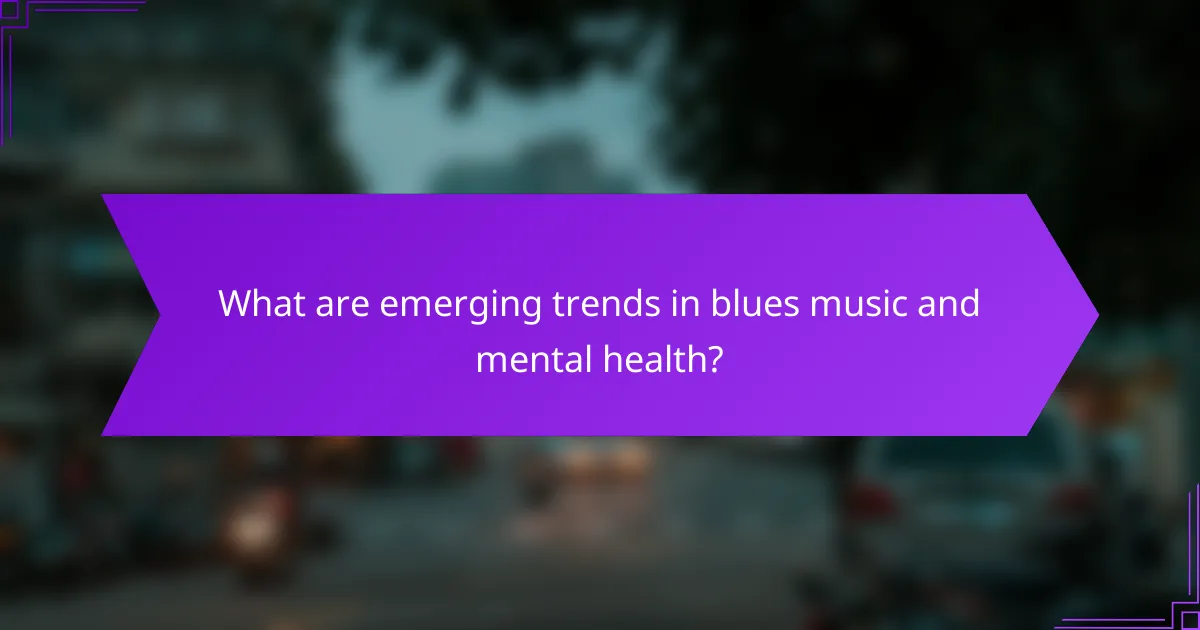
What are emerging trends in blues music and mental health?
Emerging trends in blues music and mental health highlight the genre’s role in promoting emotional well-being and community support. Musicians and therapists are increasingly recognizing how blues can serve as a therapeutic tool, fostering connection and healing among individuals facing mental health challenges.
Integration of technology in music therapy
The integration of technology in music therapy is transforming how blues music is utilized for mental health support. Digital platforms now allow therapists to create personalized playlists, enabling clients to engage with music that resonates with their emotional state. This tailored approach can enhance therapeutic outcomes.
Additionally, virtual reality and mobile applications are being used to create immersive experiences that combine blues music with guided therapy sessions. These tools can help individuals confront and process their emotions in a safe environment, making therapy more accessible and engaging.
When implementing technology in music therapy, consider the client’s comfort with digital tools. Ensure that the chosen technology aligns with their preferences and needs, as this can significantly impact the effectiveness of the therapy. Regular feedback from clients can help refine the approach for better results.
